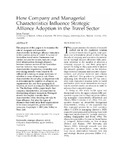| dc.contributor.author | Pansiri, J. | |
| dc.date.accessioned | 2011-06-03T09:45:53Z | |
| dc.date.available | 2011-06-03T09:45:53Z | |
| dc.date.issued | 2007 | |
| dc.identifier.citation | Pansiri, J. (2007) How company and managerial characteristics influence strategic alliance adoption in the travel sector, International Journal of Tourism Research, Vol. 9, pp. 243–255 | en_US |
| dc.identifier.issn | 1526-968X (online) | |
| dc.identifier.uri | http://hdl.handle.net/10311/821 | |
| dc.description.abstract | The purpose of this paper is to examine the role of company executive characteristics in strategic alliance formation in the tourism sector of travel. A survey of Australian travel sector businesses was carried out and the result indicate a high level of interaction through alliances between various sectors of the Australian tourism industry. Top managers' characteristics (experience, ownership,and risk taking attitude)were found to be influential in taking strategic decisions of whether to form alliances or not. These characteristics do not play an important role in determining the number of alliances an organisation has and their geographical location, as much as company characteristics do. The findings of this paper imply that company characteristics are important in determining alliance formation. Managers should thoroughly consider these characteristics when deciding not only to form alliances, but also the type of alliances that could help their organizations to be more competitive, give limited resources. | en_US |
| dc.language.iso | en | en_US |
| dc.publisher | WileyInterscience, www.wileyinterscience.com | en_US |
| dc.subject | strategic alliances | en_US |
| dc.subject | travel company characteristics | en_US |
| dc.subject | upper echelon | en_US |
| dc.subject | Australia | en_US |
| dc.title | How company and managerial characteristics influence strategic alliance adaptation in the travel sector | en_US |
| dc.type | Published Article | en_US |
| dc.link | http://dx.doi.org/10.1002/jtr.609 | en_US |

